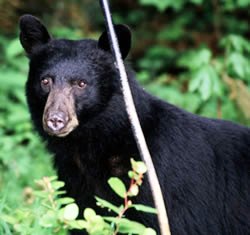Published August 28 2014
With 2,500 acres of parks and open space, Bellevue is home to wildlife such as deer, coyotes, cougars and black bears. This summer, Newport Hills residents have reported black bear sightings. Residents can take some simple steps to avoid conflicts with their wild neighbors.
- Don't feed wildlife.
- Keep pet food indoors and away from pet doors.
- Keep garbage cans secure and barbecue areas clean.
- Keep dogs on a leash.
- Keep pets indoors, especially at night.
- Stay away from den and nest sites.
- Enjoy wildlife from a reasonable distance.
- In areas where wildlife are frequently seen or heard, don't leave small children unattended.
- Leave baby animals alone. They might appear to be abandoned, but in most cases mom is nearby.
Wildlife officials say encounters between wildlife and people are rare, but as we build ever closer to their habitat, conflicts increase. In preparation for their winter naps, bears are out and about up to 20 hours a day in the fall, foraging for food.
The state Department of Fish & Wildlife manages all of the wildlife in Bellevue. The city Parks & Community Services Department manages the city's parks and open spaces for many purposes, including wildlife habitat. The wildlife in our area play an important role in the ecosystem and quality of life in this "city in a park."
Wildlife officials say to avoid attracting coyotes, black bears, cougars, raccoons and a variety of other wildlife to a neighborhood, remove all possible food sources from around residences. Garbage cans should be secure and placed in an inaccessible area, pet food should be kept indoors. It is also important to pick up fruit that has fallen from a tree, because it coyotes and bears, as well as prey species that draw predators.
If you encounter a bear, move away quietly and avoid direct eye contact. If you encounter a coyote or cougar, wildlife officials advise:
- Do not run;
- Immediately pick up small children and pets; and
- Act aggressively toward the animal by waving your arms, throwing stones and yelling. The idea is to convince the animal you are not prey, but a potential danger.
For more information, contact Laura Harper, Bellevue park ranger (425-452-7225 or lharper@bellevuewa.gov). For wildlife management questions or concerns contact the state Department of Fish & Wildlife at 425-775-1311; or see Living with Wildlife.
In case of a wildlife problem or emergency, state Wildlife officers can be reached through the department's Mill Creek regional office at 425-775-1311 during the week. On weekends and evenings, you can reach an officer by calling the nearest State Patrol office. For any emergency, call 911.

